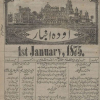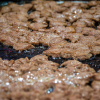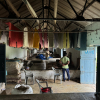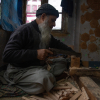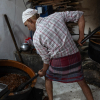The daivappura (abode of God) is central to the spiritual life of the Kurichiya and Kuruma communities, and its significance extends beyond the spiritual to the social. It is a powerful force in maintaining decorum and law and order in Kurichiya and Kuruma settlements, and its presence enforces strict vegetarianism within the premises of the muttam.
Daivappura is constructed at the centre of the muttam or tharavadu (settlement). The eldest male member of each muttam, called the karanavar, is the custodian of the daivappura. The role of the karanavar is passed down from generation to generation. Women are forbidden from entering the interior of the daivappura, but they can watch and participate in the rituals.
Every evening, the karanavar lights a lamp inside the daivappura. He is responsible for cleaning the space and its surroundings. Water filled in a vessel is kept inside the daivappura and changed every day. This water, considered holy, is usually fetched from the nearby pond or well by the wife of the karanavar, or an elderly woman. Amongst the things one finds in a daivappura are hearth for preparing food during special occasions, community’s musical instruments, a sieve to winnow grain, mat and brooms made out of grass, etc. Equipments related to agriculture, such as spade, scythe and measuring vessel units like nazhi, are also placed inside some daivappuras. Occasionally, people of the Kurichiya community tie coins, and gold and silver jewellery on a thread as vow and place it in daivappuras. The thread is untied when their wishes are fulfilled.
The life of the Kurichiyas is intrinsically connected to agriculture. Paddy seeds, considered sacred by the Kurichiya and Kuruma communities, are kept within the daivappura. Rituals are performed in the daivappura during important events related to farming, like sowing seeds and harvesting.


